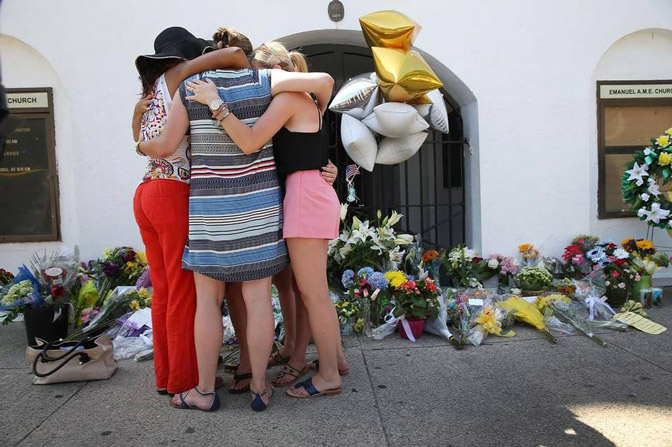The views expressed in our content reflect individual perspectives and do not represent the authoritative views of the Baha'i Faith.
Once again, we’ve all had to go through shock and sadness after the heinous and cold-blooded crime of an individual whose heart was darkened with hatred toward other human beings.
I wept when I first heard of yet another group of innocent people losing their lives because of an individual’s hate and ignorance, and I have been reflecting on how the violence can stop.
 Listening to the news of this senseless massacre in Charleston and talking to many people of various backgrounds, I have heard a sense of despair, hopelessness and fear. Most peace-loving individuals express extreme concern about the fate of humanity and the increase in bloodshed due to fanaticism and prejudices of all sorts, ranging from religious to ethnic and racial. It almost looks as if no one knows the remedy.
Listening to the news of this senseless massacre in Charleston and talking to many people of various backgrounds, I have heard a sense of despair, hopelessness and fear. Most peace-loving individuals express extreme concern about the fate of humanity and the increase in bloodshed due to fanaticism and prejudices of all sorts, ranging from religious to ethnic and racial. It almost looks as if no one knows the remedy.
Of course, no quick fix exists for these age-old problems. History has shown that significant progress takes time and happens as humanity matures. On the positive side, the American nation has made considerable progress and taken many positive steps to eradicate systematic racism. The practice of slavery officially ended in 1865. However, that act did not give African Americans full equal rights as citizens of this country. Until the mid-1960s, many parts of the United States completely segregated black and white Americans.
Reflecting on all these significant historical advances, I keep asking myself one question: does hatred and prejudice end by merely changing a country’s laws? Numerous recent events have proven that plenty of racism, bigotry and self-inflicted segregation still runs rampant among many ethnic and racial groups in this country and practically everywhere else in the world.
For example: I keep wondering why there should be separate Christian churches for African Americans, whites, Koreans, Armenians, Greeks, Mexicans, etc.–while they all believe in Jesus Christ! And I come to one conclusion. While creating laws for equal rights is a very positive step toward human progress and an absolute necessity in today’s world, it is not enough. The frequency of racially motivated incidents in the United States gives us strong evidence for the need to take additional measures. In my opinion, we need to commit to a few ultimate and very important steps to create racial harmony.
We need three major changes if we want to stop racism—a change of heart, a change in education and a major change in the way we associate with other races and ethnicities. In this short series of essays, we’ll look at each of those changes and explore how to implement them.
First and foremost, hearts must change. A mere code of laws does not change hearts. A deep belief in the essential oneness of all humanity needs to be ingrained in the general consciousness of every nation. Age-old biases and prejudices passed on from one generation to the next will not disappear with a change in laws—they will only fade away when each person has a genuine change of heart, inspired by something with sufficient power and influence to make that change possible.
The Baha’i teachings say that such deep, lasting, heartfelt change comes primarily from faith:
In the early part of the nineteenth century the horizon of Persia was shrouded in great darkness and ignorance. The people of that country were in a condition of barbarism. Hatred and bigotry prevailed among the various religions; bloodshed and hostility were frequent among sects and denominations of belief. There were no evidences of affiliation and unity; violent prejudice and antagonism ruled the hearts of men. At such a time as this Baha’u’llah proclaimed the first principle of His mission and teaching — the oneness of the world of humanity. His second announcement was the investigation of reality; the third was the oneness of the foundations of the divine religions. Through spiritual education He led the people out of darkness and ignorance into the clear light of truth, illuminated their hearts with the splendor of knowledge, laid a true and universal basis for religious teachings, cultivated the virtues of humanity, conferred spiritual susceptibilities, awakened inner perceptions and changed the dishonor of prejudiced souls to the highest degree of honor and capacity. – Abdu’l-Baha, The Promulgation of Universal Peace, p. 341.
Even though I grew up in that Persian culture with its many historical biases, my heart was touched by the Baha’i teachings. From early childhood, my parents educated me to consider the various cultures, races, religions and ethnicities as flowers of a garden. And when I moved to the United States 37 years ago, I was excited to have entered the flower garden I had read about! This country was where I associated with many people of various cultures and races–and what an exceptionally fulfilling and beautiful experience it has been!
These associations and friendships have proven the truth of what I learned as a Baha’i. Every culture and race has beauty in it, and we can gain so much from each other. In the end, we are all human beings with the same feelings and aspirations.
You May Also Like
Comments

















Why should a racist wish to even consider friendship across a racial divide?
Such made me realize 'HOW GOD WANTED HIS WORSHIPERS TO LOOK AFTER WHAT HE HAD DONE AND WHAT HIS HANDS HAVE MADE; HUMAN BEINGS, BEASTS OF THE FILED, BIRDS OF THE AIR, TREES MEANT TO SUSTAIN MAN'S BASIC NEEDS FOREVER AND EVER IF MAN ONLY LEARNS TO VALUE AND LOOK AFTER WHAT GOD HAD DONE AND WHAT HIS HANDS HAVE MADE AS PORTRAYED ON GENESIS 2 WHOLE CHAPTER AMOS 6:1-6 ITIMOTHY 5 WHOLE CHAPTER PSALM 28:5 REVELATION 11:18 ISAIAH 38:1 JEREMIAH 29:7